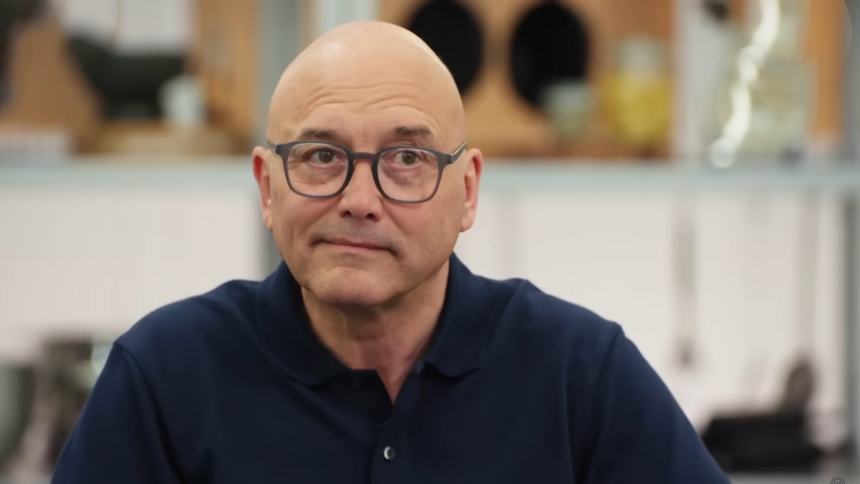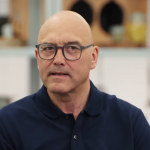Gregg Wallace, the charismatic television presenter and food critic, has been at the forefront of culinary commentary for years. Known for his energetic demeanor and forthright opinions, Wallace’s influence on food culture extends far beyond the TV screen. But what he just revealed has sent shockwaves through the culinary world and beyond. This revelation could redefine how we approach food, sustainability, and even our daily lives.
In an exclusive interview, Wallace unveiled a transformative perspective on the future of food production and consumption. He tackled issues ranging from the impact of climate change to the role of technology in shaping our diets. If you think you’ve heard it all before, think again. Wallace’s insights are not only groundbreaking but also deeply personal, offering a rare glimpse into the mind of a man who has dedicated his life to the world of food.
A Vision for Sustainable Food Systems
“The way we produce and consume food needs a radical overhaul,” Wallace began. He elaborated on the urgent need for a shift toward sustainable practices, emphasizing that the current global food system is unsustainable.
“We’re depleting resources at an alarming rate,” Wallace said. “The solution isn’t just about eating less meat or cutting down on food waste—it’s about rethinking the entire chain, from farm to table.”
Wallace advocated for the integration of vertical farming, alternative protein sources, and artificial intelligence in agriculture. He highlighted success stories of companies already leveraging these technologies to produce food more efficiently and sustainably.
“Imagine a world where every urban area has its own vertical farm,” he said. “Fresh produce grown locally, cutting down on transport emissions and ensuring everyone has access to nutritious food. It’s not a dream; it’s entirely achievable within our lifetime.”
Personal Transformation
Wallace’s passion for food sustainability is not merely theoretical. In recent years, he has transformed his own lifestyle to align with these principles. He revealed that he’s significantly reduced his meat consumption, opting instead for plant-based alternatives and sustainably sourced ingredients.
“I’ve always loved a good steak,” Wallace admitted. “But learning about the environmental impact of industrial farming made me reconsider my choices. Now, I focus on quality over quantity. If I’m going to eat meat, it’s going to be local, organic, and ethically sourced.”
Wallace’s journey has inspired many of his fans to rethink their own eating habits. His social media platforms are filled with tips on reducing food waste, recipes featuring seasonal ingredients, and advice on making more sustainable choices at the supermarket.
Addressing Food Inequality
One of the most striking aspects of Wallace’s interview was his focus on food inequality. He argued that access to healthy, affordable food is a fundamental human right, yet millions around the world are deprived of it. Wallace called for systemic changes to address this issue, from policy reforms to grassroots initiatives.
“It’s heartbreaking to know that while some of us are worried about the perfect avocado for our toast, others are struggling to afford basic staples,” Wallace said. “We need to bridge this gap, and it starts with education and community support.”
Wallace praised organizations working to combat food insecurity, such as food banks and community kitchens, but emphasized the need for long-term solutions. He proposed initiatives like subsidizing fresh produce, supporting local farmers, and implementing educational programs in schools to teach children about nutrition and cooking.
The Role of Technology
Technology, according to Wallace, is the key to revolutionizing the food industry. From precision agriculture to lab-grown meat, innovations are paving the way for a more sustainable future. Wallace expressed particular excitement about the potential of cultured meat, which he believes could address both environmental concerns and animal welfare issues.
“Lab-grown meat is a game-changer,” he said. “It’s not just about replicating the taste and texture of meat; it’s about creating a product that’s better for the planet and better for us. Imagine a burger that’s delicious, nutritious, and guilt-free. That’s the future.”
Wallace also highlighted the importance of data-driven solutions in reducing food waste. He discussed apps and platforms that connect surplus food from restaurants and supermarkets with people in need, as well as AI systems that help farmers optimize crop yields and minimize waste.
A Call to Action
Throughout the interview, Wallace’s message was clear: change is not only necessary but also possible. He urged individuals, businesses, and governments to take responsibility for creating a more equitable and sustainable food system.
“We can’t wait for someone else to fix this,” Wallace said. “Every decision we make—whether it’s choosing a product at the store or voting for a policy—has an impact. We all have a role to play.”
Wallace’s words have already sparked a wave of reactions, with fans and critics alike taking to social media to share their thoughts. While some applauded his vision, others questioned the feasibility of his proposals. But one thing is certain: Wallace’s revelations have ignited a crucial conversation about the future of food.
What This Means for You
So, how can you take Wallace’s insights and apply them to your own life? Here are a few actionable steps:
- Support Sustainable Brands: Look for companies that prioritize ethical practices and sustainability.
- Reduce Food Waste: Plan your meals, store food properly, and get creative with leftovers.
- Experiment with Plant-Based Eating: Try incorporating more plant-based meals into your diet.
- Educate Yourself: Learn about where your food comes from and the impact of your choices.
- Advocate for Change: Join local initiatives, support policies that promote food equity, and share your knowledge with others.
Wallace’s groundbreaking revelations remind us that the power to create change lies in our hands. Whether it’s through the choices we make at the supermarket or the conversations we have with friends and family, we can all contribute to a more sustainable and equitable food future.
As Wallace himself put it, “The future of food is in our hands. Let’s not waste it.”




